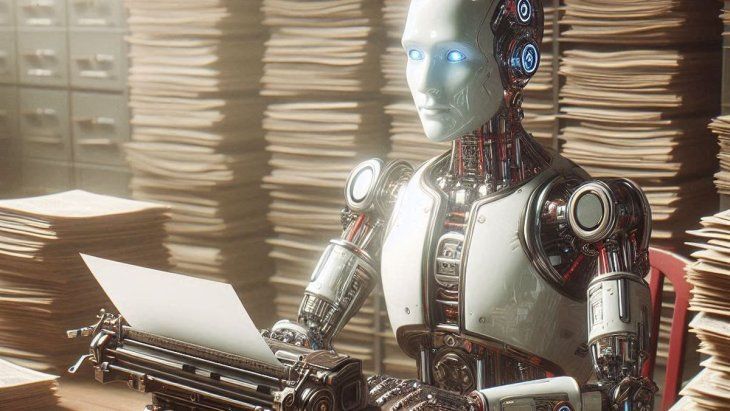Artificial intelligence (AI) is transforming the world of work, and its impact on human relationships continues to be a topic of debate. The main concern is whether AI will replace humans in their jobs, activities or relationships. However, paradoxically, we ourselves have been the ones We have become more robotic and have lost the essential characteristics that make up the human condition..
During years of exhausting sacrifice, we have adopted an efficiency logic, focusing solely on productivity, perfection of results and optimization of performance. So this approach has created the stage for robots to of course surpass us in these areas.
Recent studies and statistics show us that Today, if something is repetitive, then it could be automated, We see it in areas such as customer service, technology, finance, legal, HR, among others.
Leadership in the AI era
At the moment, many leaders do not lead and, under the banner of agility, they are more like robots than human beings, prioritizing their ego, modernizing control mechanisms and flaunting their LinkedIn positions, their titles, their awards and their finances, while lacking the skills human resources necessary for this era of work. These leaders are easily replaceable by a machine and are the first to be out of a job as technology advances.
On the other hand, focusing only on fringe benefit policies and excessive automation will chill human relationships, making them distant, and increasing negative results.
For its part, abusing AI in people management promotes impersonal accompaniments. By incorporating it into too many evaluations, directives and supervisions, there is a risk of objectifying people, freezing collaboration, demotivating them, isolating them and generating new psycho-emotional disorders, increasing discomfort. People do not want hugs and digital congratulations with emotional emptiness. The challenge will be to create a mix that allows us to reach our goals and be humanly connected.
artificial intelligence
Depositphotos
The machines still they cannot replicate the psycho-emotional complexity, energetic vibration and spiritual depth of peoplealso lacking life experiences and social skills that are essential for job development.
The greatest differentiation of leaders with AIs lies in our ability to establish empathic bonds, emotional connections and personalized recognition, essential for the well-being and motivation of teams.
After all, what we humans seek as social beings is real accompaniment with someone who transmits love, understanding, compassion, patience and tenderness to grow at all stages.
So active listening, conflict resolution, critical thinking, creativity and innovation, empathetic communication, warmth, compassion, understanding, the ability to make conscious decisions, seeing beyond appearances, reaching out hand without expecting anything in return, opening a door and generating a connection that can change a life, psycho-emotional management and improving ourselves day by day beyond the established family or work program, are essential for leaders to be able to develop their talents.
Are we preparing our job profiles and organizations for change?
At my consulting firm, we have been using the Tarasiewicz Method to help leaders from all over the world, from all types of organizations, together with their teams, to work from a more human approach, especially in this second technological wave which is having a strong impact on the global economy, business models, daily life and the workplace. The key to our work is to focus on achieving real organizational flexibility, where well-being translates into visible positive results.
We conducted a survey of the last leaders we served in the last year and a half and we understood that, to increase their levels of humanity, it was vital that They will work with their own personal and work lives so we achieved high-impact changes in perspectives and management in their lives and organizations. From what place could they help others develop professionally and emotionally at work if they increased these levels of humanity?
artificial-intelligence.jpg

Those who did not quickly became automated as a psychic defensive barrier, resulting in exhausted, stressed, sick and medicated people.
The plan to achieve this consisted of achieving his psycho-emotional balance, working deeply on both his personal and work profile, considering the past, present and future. helping them find differentials compared to market competition and now compared to AI. We address axes such as mental health, vocation, own purpose and organizational match, emotions and the life they want, among other aspects, always seeking healthy productivity that guarantees true sustainability of talent in the organization, preventing it from remaining only in a nice speech.
While it is clear that this new era will bring more changes in the way and types of work, it is also likely to create new jobs and opportunities that we cannot yet even imagine and leaders need to be prepared for new challenges. Unfortunately, if they do not work on their psycho-emotional development and update their skills, these positions will also be scarce in the near future, dealing a new blow to organizations that are already reeling from the challenges of new generations, technological changes and talent shortages. technical.
The time to wake up and act is now.
Work psychologist and Director of @trabaja.mejor
Source: Ambito
David William is a talented author who has made a name for himself in the world of writing. He is a professional author who writes on a wide range of topics, from general interest to opinion news. David is currently working as a writer at 24 hours worlds where he brings his unique perspective and in-depth research to his articles, making them both informative and engaging.




